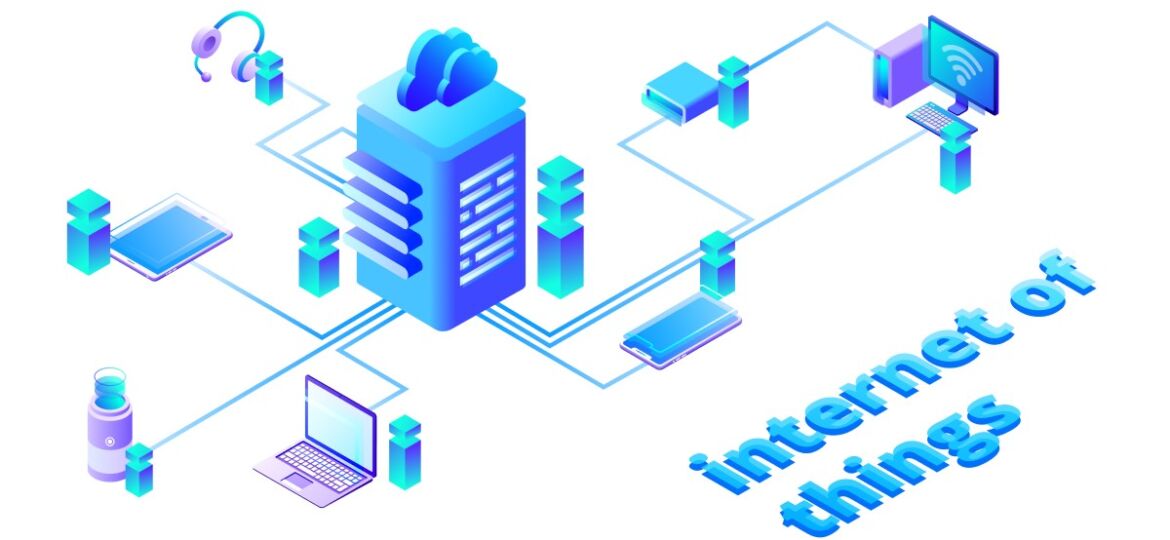
The Internet of Things (IoT, for short) is a communication network where physical objects are linked to or with larger systems. It is a term that was first used in a presentation by Kevin Ashton in 1991. Hold the Internet of Things from the watch, and it is meant for many electrical devices to communicate with each other. For example, you have a smartwatch on your wrist. This smartwatch has sensors that detect the distance you travel, the steps you take, and how your heart is beating while doing these activities. This data collected here is analyzed by a client (computer, mobile phone, etc.) and helps us organize our lives. The communication between these two devices is the essential feature that makes up the internet of things.
Systems have been formed by developing multiple technologies, real-time analytics, machine learning, commodity sensors and embedded systems. Areas such as traditional embedded systems, wireless sensor network, control systems, automation contribute to enabling the Internet of Things.
Concept of “Things”
In terms of the internet of things, the concept of the object has a comprehensive meaning. Any tracking device, biochip, sensor, or access mechanism is an object. The conditions for a machine to be “smart” are a unique name (unique identity), connectivity, and a sensor. In this way, the intelligent object becomes accessible and controllable from anywhere in the world.
Network of Internet of Things
Internet of Things applications create value by combining data from many sensors and making individual sensors accessible. It enables the transmission of large amounts of sensor data flowing from physical media to the relevant persons. In this context, the Internet of Things works with Big Data concepts and applications.
Usage Areas of Internet of Things
Internet of Things is used in many areas of daily life. For example, in intelligent traffic systems, the system can detect the traffic data in the region by analyzing the people’s movement information by continuously transmitting their positions to a central system.
Smart City Applications
Smart city applications enable city dwellers to use time and other resources more efficiently in traffic, parking, lighting, and waste management. For example, they can provide information on waste management practices, track the occupancy rates of garbage containers, optimize collection activities with garbage trucks, change container points, and change container sizes.
Smart Environmental Applications
Innovative environment applications allow observation of environmental factors such as air pollution, rainfall, dam occupancy, forest fire. Thus, it provides emergency action when necessary.
Smart Home Applications
Smart home applications developed to remotely manage and monitor the services provided by homes in matters such as light, heat, ventilation, entertainment, security.
The product with the most used IoT technology in recent days is robot vacuum cleaners. To give more examples, thanks to IoT technology, you can control your household items such as washing machines, dishwashers and refrigerators even if you are not at home. If you want to get information about smart home appliances manufacturer in Turkey. Moreover, by connecting all your smart home appliances to your computer or phone, you can control them all simultaneously. Computer manufacturer in Turkey to which you can connect your smart home appliances.
Internet of Things of Procurement Practices
It developed to contribute to procurement practices such as tracking products decreasing in stock and with an upcoming expiry date and re-ordering if deemed necessary.
Smart Livestock Applications
It developed to monitor the parameters such as temperature and harmful gas status of the environment where animals live.
Advantages of Interner of Things
The internet of things offers organizations several advantages that enable them to:
- To monitor general business processes.
- To improve the customer experience.
- Save time and money.
- To increase employee productivity.
- They are integrating and adapting business models.
- They are making better business decisions.
- To get more income.
IoT encourages companies to rethink how they approach their businesses, industries, and markets and provides them with tools to improve their business strategy. One of the most touted advantages is the predictive maintenance of industrial internet businesses that businesses offer. They include organizations using real-time data generated from IoT systems to predict errors in machines. For example, it allows companies to take action to resolve these issues before they happen before a part breaks down or a machine breaks down.
“Enhanced field service” is another common benefit. IoT technologies help field service technicians identify potential problems with customer equipment before they become significant problems. It allows technicians to resolve issues before they bother customers.
“Asset tracking” is another Internet of Things benefit. Suppliers, producers and customers can use asset operation systems to monitor the position and status of products throughout the supply chain. The system sends immediate alerts to stakeholders in case of damage or risk of damage to property. Thus, it allows them to take quick or preventive measures to correct the situation.
If you would like to learn more about business development and business management opportunities regarding the Turkish market do not hesitate to contact us!

